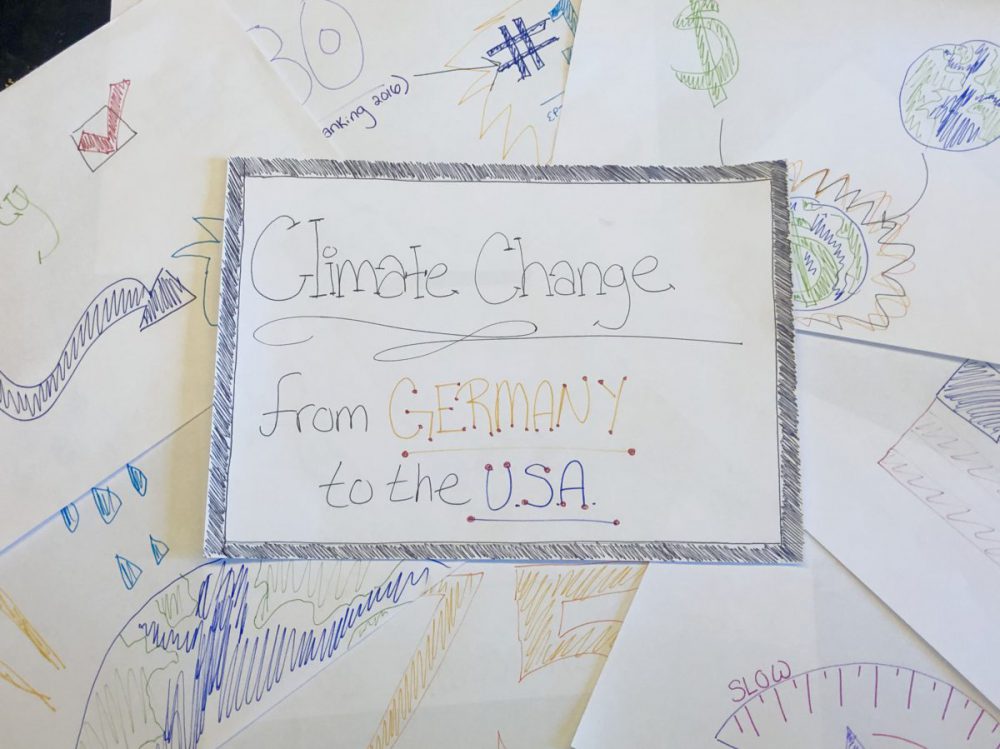When I traveled to Munich, I worried that I would have to justify or explain the U.S.’ involved political scene. As I soon found out, the people I met in Germany were too wrapped up in their own politics to discuss the issues of my nation.
Climate Change Politics
Despite the differences between German and America politics, there is one issue that translated across the Atlantic Ocean: the environment–climate change and its effect on everyone.
With the European Union elections not far behind us and the candidate pool for the U.S.’ 2020 election growing every day, politicians in both nations are addressing policies to counteract the negative impacts of climate change.
In Germany, the student youth have been an especially prominent voice on environmental issues. A large surge in Europe’s overall youth activism can be attributed to the single actions of one Swedish 16-year-old.
Why It’s Newsworthy: The youth in Germany feel that their activism is especially called for, given that their generation and those to come will be most affected by the warming of the planet. Although many are not even old enough to vote in Europe, the German students feel their voices help to bring attention to the issue of climate change. Frank Squarra, one student activist involved in Fridays for Future Munich, said the main goal of the movement is “to provide a good future for our children and our ourselves.”Fridays for Future
When Greta Thunberg decided to skip school and instead venture to the steps of the Swedish parliament, she planted the seeds for an international movement.
What started as a personal petition for immediate government action on climate change morphed into the Fridays for Future organization. The organization encourages students to skip their Friday classes and petition their governments for stricter climate change initiatives. Across Europe, Fridays for Future now joins together thousands of student activists.
The slogan, when they tell us to go back to school, is: we’ll go back to school when you do something,” —Matilda Gettins
Matilda Gettins is a 17-year-old member of Fridays for Future in Munich. She recalled going to the very first Fridays for Future protest in Munich. The cold December day was Gettins’ first time “properly skipping school”.
In the five months since then, Fridays for Future Munich has expanded their initial seventy person membership, but they are still not as large as chapters in neighboring nations.
Gaining Political Ground
This aura of environmental consciousness is nothing new for Germany. In 2016, the German government undertook an ambitious climate change policy known as The Climate Action Plan 2050.
The goal is that by 2050, Germany will have reduced its emissions of greenhouse gases by 80 to 95 percent (from 1990 levels).
To meet this goal, the country has switched to more renewable forms of wind and solar energy, which have helped to decrease its reliance on nuclear and coal-powered energy.
In 2018, the total emission of greenhouse gases in Germany had decreased by 4.5% from 2017. Despite this progress, the students still feel that politicians are not enforcing enough strict environmental legislation to make a sizable change.
The problem is that it’s always something that is done on the sidelines,” Gettins said. “I think it’s a bit of a generation gap because we will be affected the most that for us it should be a priority.”
The EU elections held in May showed the strongest support yet for the Green Party, an environment centric political party that finds some of its membership within Fridays for Future. The Green Party captured 20.5 percent of people’s vote in Germany, the second most of any party.
Gettins said Fridays for Future has received verbal support from European politicians and parties due to its trendiness and overall success. Yet, their support has not translated into any specific or wide-sweeping legislation and instead seems to stop at the podium.
Youth Activism in Germany
Fridays for Future is set apart from other environmental groups by the nature of its members, many of whom are not even of legal voting age.
“I always was kind of into politics and the protection of the environment so [Fridays for Future] was kind of perfect for me,” said Frank Squarra, a 17-year-old member of the Munich chapter of Fridays for Future.
While the young activists may not all be able to vote on the issues they petition for, Squarra feels that they make their impact by drawing attention to the topic of climate change.
In addition to the activism, Gettins and Squarra both feel that Fridays for Future gives them an instant sense of unity with their peers.
We all want to reduce the damage of climate change,” Squarra said. “People have completely different opinions, but we are all united on a single point.”
With demonstrations and protests happening all around Europe on a weekly basis, the efforts of these students are hard to ignore.
“Young people are very curious about the environment and they want to do a lot to save and protect it,” said Malin Klinski, a 22-year-old master’s degree student participating in the Rachel Carson Center’s Environmental Studies Certificate Program at LMU. “They take high risks as well to go to these demonstrations.”
While her studies in the Carson Center’s program have been academic, Klinski’s learning has also been focused on the transfer of environmental knowledge. The hope is that by sharing information and research on climate change, more people will be encouraged to take action, perhaps even joining movements like Fridays for Future.
“I’m very happy that so many people care and go to the streets and protest,” said Klinski. “The environment is something that is super urgent and comes first; before other topics in politics and that we need to act.”
Reputation of the U.S.
The arrival of President Trump and his efforts to roll back Obama era climate change legislation have been noticed by the people of Europe.
“The U.S. here has the reputation through Trump now that it’s kind of very behind on environmental issues,” said Gettins.
In 2017, the U.S. experienced the lowest levels of greenhouse gas emissions since the early 1990s. Now, these levels seem to be on the rise again due to increased economic activity and the drawback on previous environmental legislation.
Gettins feels that the lack of a national environmental movement in the U.S. may be partly attributed to the difference in political structure between Germany and the U.S.
In a lot of cases [the U.S. states] kind of do it themselves,” Gettins said. “In Europe, we expect the legislation to come from the EU and then for all of the countries to do it.”
In the U.S., states are allowed to enact environmental legislation independently of the federal government. In Germany, Gettins expressed that states often wait for legislation to be handed down from the EU before they implement policy.
Activism in the U.S.
The roots of student activism in the U.S. trace as far back as the 1800s, tackling issues of women’s suffrage and child labor. While the student survivors of the shooting at Marjory Stoneman Douglas High School in Parkland, Florida have given a new face to young activism, climate change concerns still seem to be getting pushed aside.
Seventy-five percent of U.S. adults say they’re concerned about helping the environment. Despite this, a Pew Research Center survey concluded that only 55 percent of Americans rank it as a top policy issue for the Trump administration.
Candidates for the 2020 race like Sen. Amy Klobuchar (D-Minn.) and Beto O’Rourke (D) have expressed verbal support for a Green New Deal in the U.S. Most Americans still view national security and the economy as the two top priorities on the nation’s agenda.
It may take another election to truly see the strength of the student activists in the U.S. or maybe the overwhelming chants from Europe will ignite the passions of the youth sooner.
Jillian Tracy is a junior majoring in journalism in the Grady College of Journalism and Mass Communication at the University of Georgia.








